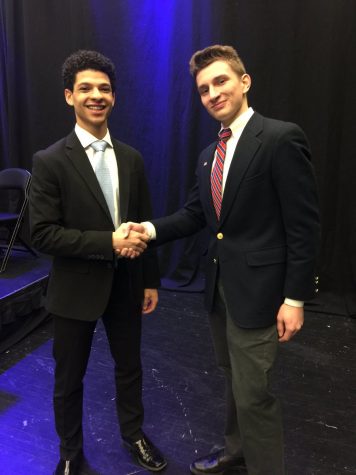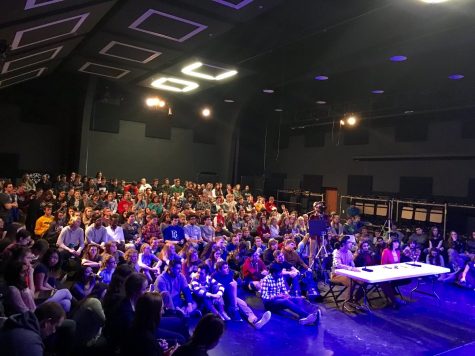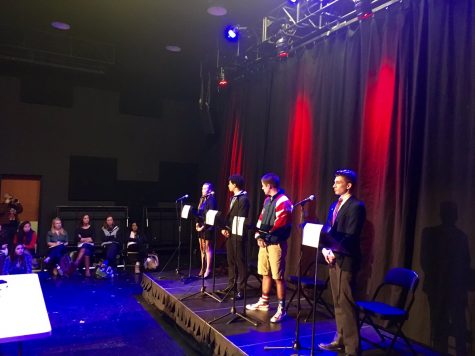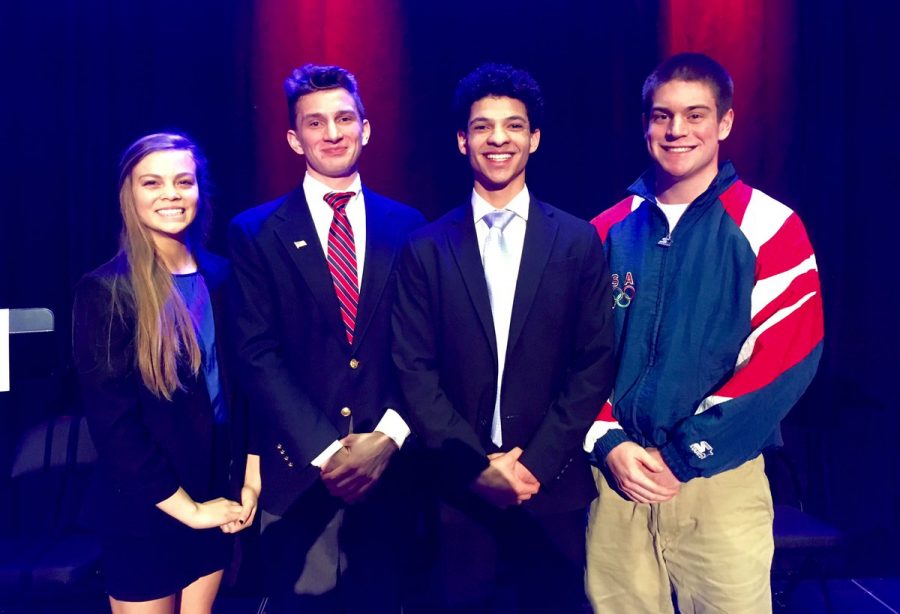AP US Government and Politics mock election sweeps the school
Candidates Hope Peterson, Gunther Treis, Kuma Okoro, and John Schneider pose after a succesful Presidential debate. Mr. Matt Dapelo said, “I thought my students were super awesome, largely active, creative, and did things I didn’t expect or ask for. I was very impressed.”
When second semester commenced, the AP US Government and Politics students were tasked to run their own mock Presidential election for the United States of Brookfield Central. AP
Government teacher Mr. Matt Dapelo decided to add this project in light of the actual 2016 Presidential election, as an attempt to teach his students about politics in a different way, as well as get the whole school excited for the race.
“My overall intent was to make this project multifaceted; give them [the students] some skills of going out, finding evidence to support a position, being able to communicate,” Mr. Dapelo said.
Both blocks of AP Government were split into five groups: two campaigns, each a different ideology; two interest groups, organizations who try to influence the government to adopt certain policies; and one media group to report on the events of the mock election.
The United States of BC was made up of 31 teachers who had agreed to designate their classrooms as individual “states,” each being renamed as a different US state name. Each classroom state received the same number of electoral votes as the actual state; for example, Mrs. Stephanie Kelly’s classroom, Wisconsin, had 10 electoral votes.
This six week project commenced on a thrilling note, as students immediately began plans to campaign to the student body. Senior candidates included frontrunner Kuma Okoro as progressive, Hope Peterson as liberal, John Schneider as conservative, and Gunther Treis as conservative.
Throughout the project, these candidates and their campaign teams worked to gain votes with advertising through posters and video ads.
“It was a great opportunity to use what we have been learning in AP Gov outside of the classroom,” said Robyn Thompson (‘16), campaign manager for Gunther Treis. “I personally would like to go into politics, so it was a great experience for me to get exposure on a smaller scale while still having plenty of responsibilities.”
The interest groups created their own campaigns to indirectly advocate for particular candidates.
“We focused on underhandedly trying to forward a couple people’s campaigns that were pro our issue,” said Sarah Brown (‘16), campaign manager for the Organization of Concerned Students interest group.
“It was highly entertaining and was fun to watch play out,” said Hannah Ludwick (‘17), campaign manager for Project GROW. “Despite our efforts, our contribution was quite minimal. We had limited courses of action due to the setup of the activity, and we felt that we did not matter in the mock election.”
Throughout the weeks, the media teams, The Brookfield Bean and The POMegranate, sent out polls to each state to share with their students in order to create demographics for the candidates. Okoro remained in the lead throughout the entire campaign.
In order to get the whole school enthusiastic and involved in the race, both the media groups collaborated to set up a debate in the Black Box during Lancer Block Feb. 26.
Attendance was greater than expected as over 200 people piled in onto the floor due to the lack of chairs. The candidates each addressed questions regarding the current Presidential debate issues. To make the debate even more professional, media members Brian Li (‘17), Abby Ng (‘16), and Saba Tahir (‘16) regulated the questioning, and the debate was streamed online for teachers and students to view in classrooms, as well as in the cafeteria.
Tiffany Kim (‘16), editor of The POM, said, “When over 200 started streaming in, and the line stretched out into the hallway, we were surprised. Thankfully, through the efforts of the team members, Mr. Dapelo and Mr. Mo, we accommodated the hundreds of interested citizens.”
The project came to a close with the final election March 8. In spite of voting open during all lunches, only 145 students voted. This voter apathy may have resulted from the requirements of student IDs and schedules to vote. Okoro won the election by a landslide of 271 electoral votes. There were some states that did not have a vote; therefore the candidate to whom their votes were given was determined by a toss of the coin at the hand of Mr. Dapelo.
“The next time you think an election of any sort will not be affected if you vote or not, think again, because you may be the deciding vote,” Treis added.
Although the actual election day was surprising with its low turn-out of voters, the overall mock election was a great experience for the AP US Government and Politics students, who extend their gratitude for everyone who participated. Several of the teachers and staff hoped their students came to understand the value of voting through participating in the mock election.
“I firmly believe in the electoral process, and I think it is the responsibility of every citizen to vote always,” said Madame Mary Mann, French teacher of the state of Maine. “This kind of thing is a good thing to be doing in school.”





